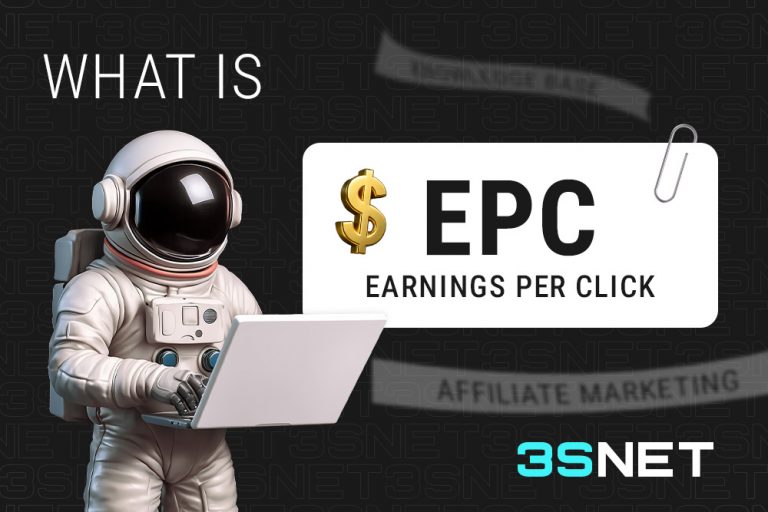
Publication date: 30 October 2025
What is EPC (Earnings Per Click) and why does it matter in affiliate marketing for gambling and betting offers? EPC shows the average amount a media buyer earns from an affiliate program or ad network for every click on an ad. It helps evaluate traffic quality and conversion performance. In gambling and betting, EPC is one of the main metrics that defines how profitable your traffic to sportsbooks and online casinos really is.
Why does EPC matter?
EPC is not a fixed payout per click — it’s a calculated value that shows how high-quality and conversion-oriented your traffic is.
How does EPC work in practice?
- A media buyer places an affiliate link from a bookmaker or casino.
- Users click on that link.
- The affiliate tracking system (for example, the bookmaker’s partner program) monitors user actions such as registrations, first deposits, and bets.
- The media buyer receives a payout for these qualified actions under CPA (Cost Per Action), RevShare (Revenue Share), or other models. Learn more in the 3S.INFO Knowledge Base article on affiliate payment models.
- The system divides the total earnings by the total number of clicks to calculate the EPC.
The calculated EPC value usually appears in your affiliate dashboard or media buying tracker.
Key insight: A high EPC means your traffic is not only clickable but also highly targeted. Users who click your links are more likely to register and make deposits. In affiliate marketing, a high EPC reflects “hot” traffic — clicks that generate real value and lead to conversions.
A low EPC, on the other hand, indicates a problem. It may mean the traffic is irrelevant — for example, bots or users not interested in betting. It can also signal tracking errors. Low EPC often points to “cold” or “junk” traffic: many clicks but few conversions, which leads to wasted budget and poor ROI.
Types and Classifications of EPC (Earnings Per Click)
EPC can be calculated in several ways, allowing for deeper analysis and smarter campaign optimization.
- Overall EPC of an affiliate program: an average across all affiliates in the network. It helps estimate an offer’s potential before launching a campaign.
- Personal EPC of a media buyer: your individual EPC metric — the one that truly matters. It can be higher or lower than the program’s overall EPC depending on your performance.
- EPC by traffic source: one of the most important metrics for optimization. It allows you to compare how effectively each traffic source converts. For instance, EPC from a teaser ad network might be $0.5, while EPC from SEO traffic could reach $2.5 — a clear indicator of where to allocate your budget.
- EPC by specific offer (bookmaker/casino): Shows how well your traffic performs for a particular partner. The same traffic flow can convert differently depending on the bookmaker or casino.
Practical Applications of EPC in Gambling and Betting
For media buyers working in gambling and betting verticals, EPC serves as a primary compass for decision-making.
1. Evaluating and Choosing Affiliate Programs
Before launching a campaign, a media buyer reviews EPC stats for different bookmakers in affiliate networks. A high EPC across affiliates indicates that the offer is “hot” — partners are successfully generating profits with it.
2. Optimizing Ad Campaigns
This is where EPC proves most useful. A media buyer runs traffic from multiple sources and compares their EPC values.
Example: You test five ad creatives for the same bookmaker.
- Creative A: 1,000 clicks, $50 earned, EPC = $0.05;
- Creative B: 800 clicks, $200 earned, EPC = $0.25.
Conclusion: Creative B brings in five times more qualified traffic. You scale that creative and pause Creative A.
3. Forecasting Revenue and ROI
Knowing your average EPC and expected click volume allows you to project future earnings.
If you buy traffic at $0.10 per click and your EPC is $0.30, your net profit per click is $0.20.
This margin between EPC and cost per click defines your overall profitability.
However, to get a full picture — including ad creative production and subscription costs — EPC must be analyzed alongside ROI (Return on Investment), the key metric reflecting total campaign profitability.
Strengths and Limitations of EPC Every Media Buyer Should Know
Advantages of EPC (Earnings Per Click) for Casinos and Bookmakers
- Core traffic quality indicator: EPC instantly shows whether your traffic is “hot” or “cold.”;
- Quick optimization tool: helps make fast decisions on which funnels, creatives, and traffic sources to scale or cut.;
- Cross-comparability: makes it possible to compare different traffic channels and affiliate programs in the same monetary language.;
- Transparency for advertisers: for sportsbooks and casinos, an affiliate’s EPC indicates their professionalism. High-EPC affiliates often receive exclusive terms and higher payouts.
Limitations and Risks of Using EPC (Earnings Per Click)
- Volatility: EPC can fluctuate due to random events such as a single player’s big win or seasonal traffic shifts.;
- Incomplete picture: EPC doesn’t account for CPC (Cost Per Click). You might have an EPC of $1, but if you pay $1.20 per click, you’re operating at a loss. Always analyze EPC together with ROI (Return on Investment).;
- Manipulation risk: some unreliable affiliate programs may underreport conversions to artificially lower EPC. Always work only with verified partners in the gambling and betting industry.
Why EPC (Earnings Per Click) Matters for the iGaming Industry
Essentially, EPC completes the analytical cycle — from traffic investment to profit generation. Correctly understanding and interpreting this metric allows media buyers to turn data into revenue streams. It also helps convert test budgets into scalable campaigns.
For the iGaming industry, adopting EPC-based performance evaluation represents a higher level of professionalization. Bookmakers gain access to high-quality player sources, while media buyers benefit from transparent and measurable reward systems.
Mastering EPC is a key skill that separates beginners, who often waste budgets, from professionals who build sustainable businesses in traffic arbitrage. This is especially true in verticals such as sports betting and online gambling.
FAQ
What is EPC and How to Calculate It?
EPC (Earnings Per Click) is your average earnings per click. This metric shows how much money you earn, on average, for each click on your affiliate link. It’s calculated using a simple formula: total earnings divided by the total number of clicks. For example, if you’ve earned $300 from 1500 clicks, your EPC is $0.20.
How Does EPC Differ from CPC?
EPC and CPC are opposing metrics. EPC (Earnings Per Click) is your income per click—it’s what you earn. In contrast, CPC (Cost Per Click) is your expense per click—it’s what you pay to acquire that click. Your campaign’s profitability is determined by the difference between the two: if your EPC is higher than your CPC, you are profitable.
What is Considered a Good EPC?
A “good” EPC is relative and highly dependent on your niche and traffic costs. In high-competition, expensive verticals like gambling or fintech, EPC can range from $0.50 to $5 and above. In more mainstream verticals, EPC typically falls between $0.05 and $0.30. The key criterion is that your EPC must be consistently higher than your cost per click (CPC).
Why is My EPC Low and How to Improve It?
A low EPC indicates that your clicks are not converting into revenue. The primary reasons are non-relevant traffic, an unappealing offer, a poor-performing landing page, or technical tracking issues. To increase your EPC, you need to test and optimize three key elements: your traffic source by driving more targeted audiences, your ad creatives to generate better interest, and your affiliate offers by selecting those with higher conversion rates.
What is More Important for Profit: High EPC or High CTR?
Both metrics are important, but EPC is directly tied to money, while CTR relates to engagement. A high CTR (Click-Through Rate) means your ad is compelling and attracts clicks. A high EPC means the users who click are completing desired actions and generating revenue. Ultimately, EPC is more critical because it reflects the actual profitability of your traffic, not just its volume. You can have a massive CTR but a zero EPC and still end up with a loss.
Share it with your friends via favorite social media

















